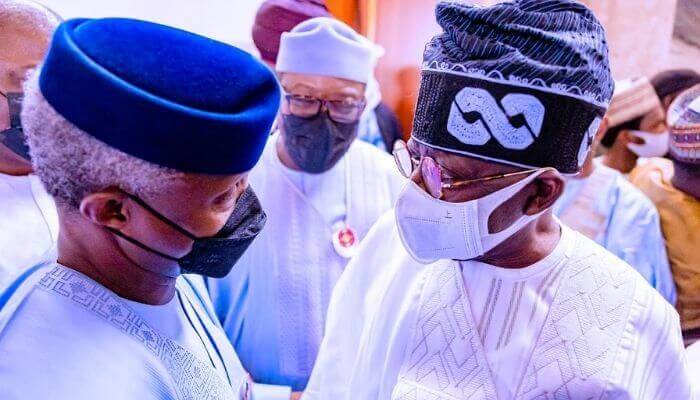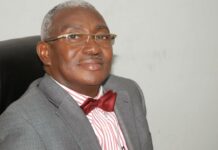By aspiring for the highest political office in Nigeria, Osinbajo has committed no crime – not against Tinubu or anyone else. It is high time the Jagaban of Borgu Kingdom and Asiwaju of Lagos politics stopped whining over Osinbajo’s aspiration. Let the people decide. That is the beauty of democracy.

By Ikechukwu Amaechi
On Monday, April 11, Nigeria’s Vice President, Yemi Osinbajo, declared his intention to contest the 2023 presidential election.
In a short broadcast via his Twitter handle after months of speculation, Osinbajo said having served as Vice President “under a true Nigerian patriot, a servant of the nation in war and peace, and a man of integrity, President Muhammadu Buhari,” he had acquired enough cognate experience to formally declare his “intention to run for the Office of the President, Federal Republic of Nigeria,” on the platform of the All Progressives Congress (APC).
And all hell broke loose.
Even if no other aspirant is to be vigorously interrogated on his record in public office in this election cycle, Vice President Osinbajo should.
The fact that he is not distancing himself from the Buhari-led administration as some others in his shoes would have done is commendable and at the same time makes it easier for the electorate to decide his fate at the polls.
In fact, Osinbajo is running on the records of the Buhari-Osinbajo administration.
“We have, together, worked through some of the most difficult times in the history of our Nation, but we have remained focused on securing the country, providing infrastructure and growing our economy,” he said in his declaration speech.
One would have thought that going forward, the issues around Osinbajo’s presidential aspiration will be the ones he raised himself.
To what extent has the government in which he is the second-in-command been able to secure the lives and property of Nigerians and the territorial integrity of the country?
Even as the regime, as he claimed, remained focused on growing Nigeria’s economy, what is the scorecard?
What about the provision of infrastructure? Do the infrastructure which the Buhari-Osinbajo government claim to have provided in the last seven years justify the level of indebtedness the country has been plunged into?
Osinbajo said he has visited our gallant troops in the Northeast and our brothers and sisters in the IDP camps and felt the pain and anguish of victims of violent conflicts, terrorist attacks, flooding, fire and other disasters, without saying what the government did or is doing to lessen the pain of those who are displaced and distressed.
READ ALSO: Reactions as Osinbajo formally challenges Tinubu for APC presidential ticket
When the Vice President said he stood where victims of violent conflicts stood and sat where they sat, what did he really mean? When he claims that he knows their hopes, aspirations and fears; and ululates in his belief that in those hopes and aspirations are the seeds for the great Nigeria that we all desire, Nigerians should be able to ask him what that belief, beyond the sophistry and rhetoric, means.
Did Osinbajo hear that the terrorists who attacked the Abuja-Kaduna train and abducted dozens of innocent citizens are claiming that Buhari knows what they want? Does he know what his principal, the person he calls a patriot, know. Can Osinbajo vouch for Buhari?
These are the issues that should dominate public discourse. The questions are legion. But rather than talk about issues, Osinbajo’s kinsmen are busy lamenting how the Vice President betrayed their benefactor, Asiwaju Bola Tinubu, as if what is at stake is the Federal Republic of Tinubu, rather than Federal Republic of Nigeria.
How does the decision of a member of the Tinubu political family to go rogue, assuming, without conceding that is what happened, concern other Nigerians who are not members of that political family?
It is obvious that Tinubu is livid with rage that Osinbajo threw his hat into the presidential ring. His rabid supporters have labelled the Vice President a ‘Judas Iscariot.’ Ever since he made that declaration, he has been trolled endlessly in the social media. Some have called him a Yoruba quisling, warning that his fate will be worse than that of Ladoke Akintola should Tinubu lose the APC presidential ticket.
But what crime did Osinbajo, in real terms, commit against Tinubu? Perhaps, the former Lagos State governor wanted to go into the race with the façade of a united Southwest and Osinbajo’s arrival at the scene has put a lie to all that.
But how did Osinbajo betray Tinubu? Was there an agreement between them that because Tinubu appointed him Attorney General and Commissioner for Justice when he was elected governor of Lagos State in 1999, therefore, Osinbajo should not dare aspire for any high office unless he clears with Tinubu?
Tinubu’s supporters talk about how he single-handedly made Osinbajo Vice President. Even if that narrative is true, to be sure, it does not seem to be, but even if it is, so what?
What on earth qualifies Tinubu to aspire to be president of Nigeria that disqualifies Osinbajo?
As at the time the newly elected governor of Lagos tapped him to be the Attorney General and Commissioner for Justice in 1999, Osinbajo, a Senior Advocate of Nigeria (SAN), who began his public career in 1988 as a Special Adviser to the then Attorney-General and Minister of Justice, Prince Bola Ajibola, was already a Professor of Law and Head of Department of Public Law, University of Lagos.
So, he was not a nonentity, an insignificant person. He was a staff member in the justice division of the United Nations Operations in Somalia, UNOSOM II. Even while serving Lagos State in 2006, he was appointed a member of the United Nations Secretary General’s Committee of Experts on Conduct and Discipline of UN Peacekeeping Personnel around the globe.
Unlike most professional politicians without a second address, Osinbajo returned to the University of Lagos to teach law after his stint in public office even as he became the Senior Partner, SimmonsCooper Partners (Barristers Solicitors).
If such a man is not qualified to run for the highest office in the country, who else qualifies?
In any case, at 65 years, Osinbajo is no spring chicken any more. If Tinubu is 70 years as he claims, he is only five years older than Osinbajo. They are contemporaries in a sense. And if Tinubu, whose highest political office is being governor of Lagos State, can aspire to be President of Nigeria, then what disqualifies a man who is holding a superior political office by virtue of election, not appointment, from doing so? Should the country’s number two citizen be stopped from aspiring for Nigeria’s political diadem simply because he was at a time a political appointee of someone?
Tinubu and his co-travellers are feeling so bad about Osinbajo’s aspiration because deep down and in truth, they are pseudo-democrats, who abhor freedom of choice which is the hallmark of democracy. Theirs is politics of imposition that brooks no opposition of whatever hue.
But they forget that even in this country, children have run for elections against their biological parents. Prior to independence, Mazi Samuel Goomsu Ikoku, popularly called SG, a trusted lieutenant of Chief Obafemi Awolowo, with whom he co-authored a book, Forward with Democratic Socialism, astoundingly defeated his biological father, Alvan Ikoku, at the Southeastern House of Assembly in the late 1950s.
Alvan Ikoku, the man who was defeated by his ideologically-leaning son, was an intellectual giant, a man who had his Bachelor of Arts (BA) degree in 1928, long before Dr. Nnamdi Azikiwe and Chief Obafemi Awolowo, an astute politician who was nominated to the House of Assembly (Eastern Nigeria) where he sat on the Board of Education in 1946, and a year later, was a member of the Legislative Council in Lagos representing the Eastern Region from 1947 to 1951.
Though SG’s victory shocked many, including his father, he did not disown him or see his son’s victory as an abomination, unlike Tinubu, who in anger, quipped, “I have no son old enough to declare for President,” when journalists asked him about Osinbajo’s declaration. Rather than travel the route of bitterness which Tinubu has chosen, Ikoku gave his son, SG, his full support and even provided funds for his re-election in 1961.
That is the Igbo way of playing politics. It is a game played on the turf of ideas and not godfatherism. At the end of the day, those who deride Ndigbo as being politically naïve but brook no opposition whatsoever are the real problems of Nigeria’s democracy.
By aspiring for the highest political office in Nigeria, Osinbajo has committed no crime – not against Tinubu or anyone else. It is high time the Jagaban of Borgu Kingdom and Asiwaju of Lagos politics stopped whining over Osinbajo’s aspiration. Let the people decide. That is the beauty of democracy.














